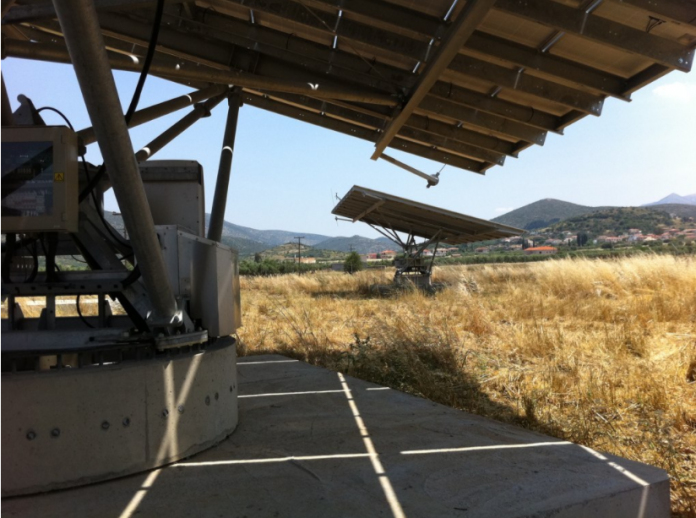Greece has announced plans to install two large solar PV parks at mining sites. The investment will come from the national electric utility as part of its new strategy, in line with Greece’s efforts to phase out coal.
The Greek solar market has returned to growth via a series of tenders, as individual actors increasingly embrace PV technology to reduce costs and reach their sustainability standards. And a recent wave of official announcements regarding the development of solar PV projects in the country’s mining regions has also started to dominate headlines.
The goal is to install a massive 2 GW solar project in Ptolemaida (Kozani), northern Greece, and another 1 GW photovoltaic park on the Peloponnese Peninsula, southern Greece. Construction is set to start by as early as next year.
Mega-solar plans
Greece’s environment and energy minister, Kostis Hatzidakis, made a formal announcement last weekend when meeting local stakeholders in Ptolemaida, in Greece’s Macedonia region.
The minister said Greece’s Public Power Corp. (PPC) would move “rapidly” to install a 2 GW solar PV plant in the region, which is known for lignite mining.
PPC CEO George Stassis confirmed that the state-owned utility had submitted an application to the Greek energy regulator, RAE, for a generating license for 1.5 GW of PV capacity in Ptolemaida in December.
However, pv magazine has learned that PPC also plans to install an additional 1 GW of solar PV capacity in Megalopoli, which also has mining sites and a coal-fired power plant.
Just Transition
The move is part of Greece’s efforts to phase out coal from its electricity system by 2028. Hatzidakis told local stakeholders in Ptolemaida that the government will help the region shift to a new economic model, without relying on the exploitation of fossil fuels. The vast 2 GW photovoltaic park is also part of the government’s plan to create new jobs in the region as it transitions to a coal-free future.
The Greek government has requested the technical assistance of the European Commission, the European Investment Bank (EIB), and the European Bank for Reconstruction and Development (EBRD) to design a new economic model for the country’s mining regions.
Greece’s mining towns will also be supported by the European Union’s Just Transition Mechanism, which is part of the bloc’s Green Deal. It will mobilize funds to support workers and citizens of the regions that will be most affected by the transition to a coal-free future.
The government’s plans are encouraging, but it is discouraging that to date local stakeholders (that is, town councils in the mining regions) have been unable to draft any meaningful proposals. Should this continue, the transition to a post-lignite era will have to happen with a top-down approach.
The Greek arm of the World Wide Fund (WWF) has produced a documentary that explores the EU Just Transition in Greece. The documentary, which includes English subtitles, is available via this link.
Economic sense
Apart from the environmental motivation, Greece’s policy decision to get rid of its state-owned lignite fleet also makes economic sense.
The PPC is losing millions each year by operating uneconomic lignite units and the company is running a huge deficit. Unless it closes down its lignite business, the PPC is set for bankruptcy.
The new Greek government elected in July has appointed George Stassis to transform the PPC and upgrade its outdated business strategy.
Part of the PPC’s strategy U-turn is to invest in renewables, either alone of with leading international actors. The PPC’s advantage is that it has about 6 GW of renewable power capacity to license out and some of this capacity is expected to be approved in the near future.
However, at the same time, this has started to become less of an advantage, given that Greece’s government announced in January that it is fundamentally restructuring its licensing regime, in order to introduce a digital system that speeds up the whole process.
The PPC has signed a number of memoranda of cooperation with international firms to jointly develop renewable power projects in Greece. This week for example, the PPC signed a cooperation agreement with Portugal’s EDP Renewables, aiming to co-develop at least 400 MW of renewable power capacity in Greece.
The PPC’s vast PV parks in the mining regions will likely be broken up into special purpose vehicle firms to be co-financed with international actors.
Kozani project
Meanwhile, Greece’s energy minister also announced that German developer Juwi is selling 204 MW of capacity under development in Kozani, secured under three tender contracts, to Greece’s Hellenic Petroleum.
The project is made up of three chunks (139.24 MW, 27.68 MW and 37.37 MW), with the largest slice having won a tariff of €0.05446/kWh, and the other two a €0.06472/kWh tariff each.






